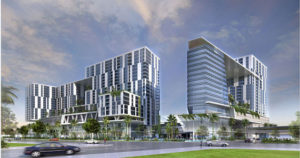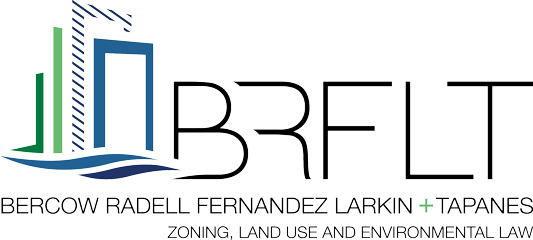New Project Gains Commission Approval
July 20, 2016Miami-Dade approves huge Metrorail station project so you can ditch your car
The Douglas Road Metrorail station is poised for a massive redevelopment that includes nearly 1,000 apartments, shops and a 150-room hotel, part of a far-reaching plan by Miami-Dade County’s transit agency to transform land around its train stops into urban hubs whose residents won’t need to rely on cars.
The Link at Douglas, a joint venture of developers 13th Floor Investments and the Adler Group, got a green light Tuesday from the Miami-Dade Commission, which approved a long-term lease of the station’s parking lot for the project. The partnership had earlier beat out the Related Group in a competition for the lease bid.
The deal is expected to funnel $464 million over 30 years directly into the fiscally strapped transit agency’s budget. It is the second one involving public station land along the critical U.S. 1 corridor to receive final commission approval amid a push by the administration of Miami-Dade Mayor Carlos Gimenez to belatedly fulfill the promise of Metrorail’s construction 35 years ago.
That original vision included fostering development linked to the stations to feed people to Metrorail while putting a damper on the growth of traffic congestion, but it stalled for decades after the development of the Datran Center office and hotel complex at the Dadeland South station in the mid-1980s. Efforts to develop the South Miami and Coconut Grove stations were mired for years in litigation which has only recently been cleared up, allowing mixed-use residential and commercial projects at both stations to now begin moving forward as well.
Last December, the commission approved a settlement that would allow developer Grass River Holdings to build a $196-million project with a hotel, retail, offices and 250 rental apartments on the Grove station’s parking lot pending completion of a lease agreement. The Miami-Dade commission has also approved a lease for a smaller-scale deal at the Dadeland North station, also with 13th Floor and Adler, for construction of 300 apartments with ground-floor retail, said Nicole Shiman, 13th Floor’s vice president.
The timing is propitious because of growing demand, especially among millennials, for affordable urban living close to public transportation that’s driving developers to compete to build near transit stations, said Frank P. Guyamier, deputy director of Miami-Dade’s department of transportation and public works. Some, like Grass River, which recently completed a residential and commercial project a block north of the Grove station, are snapping up and building on privately owned property around Metrorail and Metromover stations. Meanwhile, 13th Floor is building a 50-story condo tower next to the Tenth Street Metromover station in Brickell.
“Through the years, these properties have become extremely valuable,” Guyamier said. “What you’re seeing is more and more people becoming accustomed to using transit, and you mix that with millennials who are into public transportation, and you end up with huge demand for these facilities.”
The ambitious blueprint for the Douglas Road station, which also includes a requirement that the developers spend $15 million on station improvements, is the biggest contemplated on transit department land so far. Details are not fleshed out, and the county, which controls zoning and permitting on station property, would have to review and approve specific plans, which are being drawn up by the local office of architectural giant Stantec. The agreement is for a 30-year ground lease with two 30-year extensions.
Shiman said the developers envision four towers, each 20 to 30 stories tall, to be built in phases on more than seven acres flanking the elevated station and wrapping around an adjacent Miami-Dade water and sewer office building. Of the planned 970 units, about 115 would be set aside as affordable “workforce” housing.
The station lot’s 300 parking spaces would be replaced with garage spots in the tower pedestals. Ground-floor retail would comprise 70,000 square feet of space and include what the developers described in a release as “a premium supermarket.”
Among the station improvements, Shiman said: a large public pedestrian plaza that would occupy the center of the development, and replacement or improvements to escalators, lighting and flooring at the Metrorail station. The developers will also donate $600,000 to the Underline, the nonprofit effort to convert the underused M-Path beneath the elevated Metrorail tracks along U.S. 1 into a 10-mile-long linear park and commuter route for cyclists and pedestrians.
The project would mark a significant addition to what is already becoming a dense residential district straddling Miami and Coral Gables, whose boundary sits just west of the Douglas station. Rezoning by both cities has produced a spate of new condo and apartment buildings around the upscale Shops at Merrick Park in what used to be an industrial and office district bounded by Douglas and LeJeune roads and U.S. 1 and Bird Road.
Because the Douglas station already serves as a connecting point for Metrorail and Coral Gables’ free trolley circulator, the addition of bike- and pedestrian-friendly features and connections will encourage residents to ditch their cars for commuting and everyday activities, Shiman said. Though the initial plan calls for 1,800 parking spaces, the developers would like to significantly reduce that number since the overriding goal is to reduce auto use. A new zoning measure allows development at transit stations to be built with no parking, she noted.
“A family that may have two cars could get rid of one car. We’re big believers in the use of transit,” she said. “We would really like to make this a marquee transit-oriented development which causes people to get rid of their cars.”
Miami-Dade is a latecomer to such transit-oriented development, which has become a successful tool in redeveloping neighborhoods in cities around the country, such as Washington, D.C., and its transit-connected suburbs in northern Virginia.
The county has had success with the concept in more recent years, completing affordable housing developments with some limited retail at the Brownsville and Northside Metrorail stations.
It’s unclear what the impact of the Douglas Road redevelopment might be on either Miami or Coral Gables, how well the station zoning meshes with the adjoining municipalities, or whether either city will participate in vetting the project as it’s reviewed by the county. Shiman said the developers and county officials were prevented from discussing the proposal while it was under consideration under Miami-Dade’s strict “cone of silence” ordinance.
The deal’s approval comes as two proposals for mixed-use development along South Dixie in the Gables — a redevelopment of the Holiday Inn across from the University of Miami and a large project on the former Gables Ford dealership lot that require height increases — come under intense fire from Gables residents upset about their scale. The Paseo project on the Holiday Inn property, approved by the Gables commission, has drawn a lawsuit from surrounding residents, who contend it violates the city’s comprehensive development plan.
– Andres Viglucci
















































